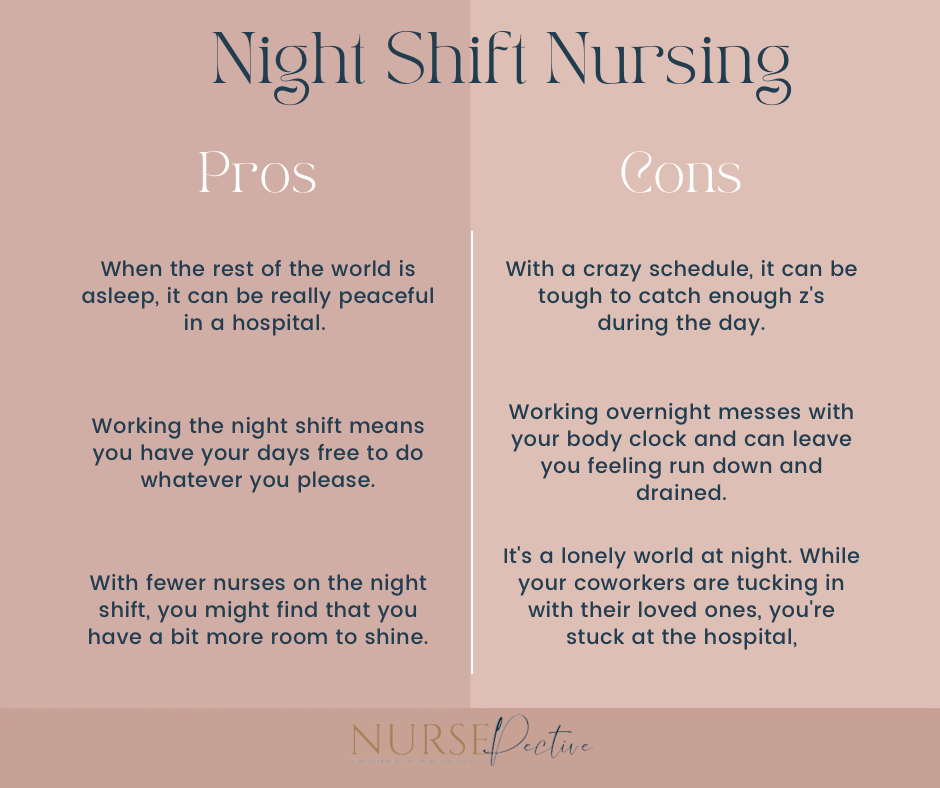
There are many differences between day shift vs night shift nurses, but the most obvious one is that they work at different times. Day shift nurses work during the day, and night shift nurses work at night. It's as simple as that!
But wait—there's more!
Day shift nurses are required to have a different set of skills than night shift nurses. For example, day-shift nurses are required to deal with the stress of working under pressure during their shifts, while night-shift nurses must be able to stay awake for longer periods than their day-shift counterparts.
In this article, we'll explore what makes these two groups of professionals so different from each other and look at some ways to prepare yourself if you're interested in becoming either type of nurse.
Who is a Day Shift Nurse?

Day shift nurses are the early risers. They're the people who wake up, get out of bed, and start their day at the crack of dawn.
Day shift nurses tend to be younger and more energetic than night shift nurses. They're also typically more flexible regarding working hours since they're not as dependent on sleep (as opposed to night shift nurses).
Day shift nurses work at a variety of facilities across all levels of healthcare.
They can work in hospitals or clinics, they can work in surgery centers or urgent care facilities, and can even work in private homes if they're hired privately as an independent contractor.
What is the Schedule of a Day Shift Nurse?
There are many different types of day shifts. A day shift, maybe 8 hours Monday – Friday. These 8-hour shifts may be between the hours of 7 am -3 pm. Another type of day shift, maybe 12 hours. These 12-hour shifts may be between the hours of 7 am-7 pm.
The schedule for a day shift nurse can vary depending on the hospital, but it's likely that you will have some time during a 24-hour period to sleep and eat meals.
You'll also have time to exercise and take care of personal business, such as going to the bank or grocery shopping if needed.
Responsibilities of a Day Shift Nurse

Well, let me tell you, being a day shift nurse is no walk in the park! But it's definitely one of the most rewarding jobs out there. You're in charge of caring for patients and ensuring they receive the best possible care, so there's a lot on your plate.
1) Patient Care
First off, let's talk about patient care. You're responsible for checking on patients regularly, monitoring their vital signs, and administering any medications they may need.
It's essential to keep close tabs on patients and report any changes to their condition to the physician on call.
Plus, you have to keep an eye out for any adverse reactions to treatments and be ready to act fast if necessary.
2) Communication With Patients and Family
Another big part of your job is communicating with patients and their families. You must be able to explain medical procedures and treatments in a way that's easy to understand. It's also important to listen to their concerns and be a supportive ear.
Building a rapport with patients is key to making their hospital stay as comfortable as possible.
3) Maintaining Paperwork
Oh, and let's not forget the paperwork! You'll need to keep accurate records of a patient's health and treatment, document any changes to their condition, and ensure all the T's are crossed and I's are dotted.
It may not be the most exciting part of the job, but it's critical to providing top-notch care.
4) Collaboration with Other Healthcare Providers
Lastly, you'll need to work closely with other members of the healthcare team, including physicians, pharmacists, and other nurses.
It's a team effort, and you gotta be able to collaborate effectively to ensure the best possible outcomes for patients.
So there you have it! As a day shift nurse, you wear many hats, but it's all worth it when you see the difference you make in patients' lives. It can be a tough gig, but it's also incredibly fulfilling.
Pros and Cons Of a Day Shift Nurse

Being a day shift nurse has so many perks! Here are just a few of the many advantages:
Advantages
- Say goodbye to graveyard shifts! Working during the day means you get to sleep at night and have a regular schedule, which is a total game-changer.
- Better work-life balance. With a day shift, you have more time to spend with friends and family, go to the gym, or just relax. No more worrying about missing important events!
- More opportunities for overtime and extra shifts. Let's face it, hospitals are busiest during the day, and night shifts tend to get first dibs on overtime. So, as a day shift nurse, you're more likely to pick up some extra cash.
- Better support from coworkers. It's easier to coordinate and collaborate with your colleagues when you're all working the same hours. Plus, you'll have access to more resources during the day.
- More opportunities for professional development. Hospitals offer many training, workshops, and other professional development opportunities during the day. So, as a day shift nurse, you'll have more chances to enhance your skills and grow in your career.
- Better exposure to patients. With more patients coming in during the day, you'll have the chance to work with various cases and gain more experience.
- Better patient outcomes. With more support, resources, and collaboration, day shift nurses can provide higher-quality care and help improve patient outcomes.
Cons
Being a day shift nurse ain't all sunshine and rainbows. Don't get me wrong, it's a noble and rewarding profession, but there are definitely some downsides.
- Burnout: Working the day shift can be exhausting, especially when it comes to dealing with non-stop patient care and administrative tasks. Nurses often work long hours and have limited breaks, which can lead to burnout.
- Lack of Diversity: Day shift nurses often miss out on the diverse patient population that comes in during the night shift. This can limit their exposure to different medical conditions and limit their growth as a nurse.
- Reduced Overtimes: Day shift nurses typically miss out on the extra pay that comes with working overtime or on holidays. This can be a bummer, especially for those who could use the extra cash.
- No "me time": When you work the day shift, there's often no time for personal errands or activities. You're stuck at work, which can make it hard to balance work and life.
- Daylight Blues: Let's face it, not everyone is a morning person. Working the day shift can be tough for those who struggle with an early rise and lack of sleep. Plus, the lack of natural light during the winter months can make it difficult to stay awake and alert on the job.
Who is the Night Shift Nurse?

Night shifters are absolute lifesavers! They're the unsung heroes who work the graveyard shift and keep the hospital running like a well-oiled machine.
These folks are truly dedicated - they work when most folks are fast asleep, making sure that patients are comfortable, meds are administered on time, and that any emergencies are handled in a jiffy.
It's not easy, let me tell you. Night shift nurses have to be alert and focused, even though their natural rhythm is disrupted.
They have to be quick on their feet and able to handle any curveball that comes their way because emergencies don't take a break just because it's the middle of the night.
But despite the challenges, night shift nurses love what they do. They form a close-knit community, and they take pride in the fact that they're there for patients when they need them most.
Plus, there's a certain satisfaction that comes with working when the rest of the world is still. It's almost like they have the hospital to themselves, and they can focus on doing their best work.
So, if you ever find yourself in the hospital overnight, know that you're in good hands with the night shift nurse. They'll make sure you're taken care of, and you'll be on the road to recovery before you know it!
What is the Schedule of a Night Shift Nurse?
The night shift duration will generally depend on the medical institutions where you work. 12-hour shifts can be from 8 pm to 8 am, or 8-hour shifts can be from 11 pm to 7 pm.
You'll be working with a different team of staff and patients every night, so it's essential that you're familiar with this schedule and how it works before starting your new job.
Responsibilities of a Night Shift Nurse

As a seasoned night shift nurse, let me tell you, there's a whole lot of responsibility that comes with the job. When the sun goes down, it's our time to shine.
We gotta step up and make sure everything runs smoothly for our patients. And let me tell you; it's no walk in the park!
1) Patient Care
First off, let's talk about patient care. We gotta keep a close eye on all our patients, especially since they're usually sleepin' and can't speak up if something's wrong.
We must keep them comfortable, administer any meds on time, check vitals regularly, and document everything thoroughly.
It's a big responsibility, but we must make sure our patients are in good hands.
2) Be Ready for the Emergency
Next up, we have to be quick on our feet. Emergencies can happen anytime, and we must be ready to respond.
Whether it's a cardiac arrest, a code blue, or just a patient in pain, we must act fast and make sure they're getting the help they need.
And let me tell you, the adrenaline rush is real during those moments!
3) Communicate with the Other Healthcare Providers
Communication is vital too. We have to work with our colleagues, whether it's the doctor, the pharmacist, or even the custodian, to make sure everything runs like clockwork.
It's crucial to stay on the same page and keep each other in the loop, especially since we're the only ones on duty at night.
4) Make Sure to Practice Self-Care
Finally, let's not forget about self-care. Night shifts can take a toll on our health, both physically and mentally. It's crucial to take breaks, stretch our legs and catch a quick nap if we need to.
It's also essential to have a solid support system, whether it's our colleagues or loved ones, to help us get through the night.
Pros and Cons of a Night Shift Nurse

There are many benefits to working the night shift as a nurse! Here are a few that come to mind:
Pros
- Peace and quiet: When the rest of the world is asleep, it can be really peaceful in a hospital. With fewer visitors and fewer interruptions, you can really focus on your work and get a lot done.
- Time to yourself: Working the night shift means you have your days free to do whatever you please. Whether spending time with your family, pursuing a hobby, or catching up on some much-needed Z's, you'll have plenty of time to recharge your batteries.
- Less competition: With fewer nurses on the night shift, you might find that you have a bit more room to shine. You could take the lead on a project or take charge of a difficult patient and really make a difference.
- Different pace: Night shift work can be a great change of pace. If you're feeling a bit burned out on your routine, a few nights working in a new environment could be just what the doctor ordered.
- Good pay: Let's face it, night shift work often comes with a premium. So, if you're willing to put in a few extra hours, you could be looking at some extra cash in your paycheck.
- Flexibility: Working the night shift gives you a ton of flexibility when it comes to scheduling. If you need to take a few days off, you can usually arrange your schedule so that you're not working the nights you need to be off.
Cons
- The struggle is real when it comes to getting enough shut-eye. With a crazy schedule that has you working when the rest of the world is snoozin', it can be tough to catch enough z's during the day.
- It's a lonely world at night. While your coworkers are tucking in with their loved ones, you're stuck at the hospital, dealing with all the drama and emergencies that come with the night shift.
- The body takes a beating. Working overnight messes with your body clock and can leave you feeling run down and drained. And forget about maintaining a healthy diet or exercise routine when you're working crazy hours!
- It can be a thankless job. Let's face it; most people don't have a lot of sympathy for those who work overnight. They assume you chose the hours and can just tough it out.
- It can put a strain on relationships. With a schedule that has you working when everyone else is playing, it can be tough to maintain friendships and romantic relationships. And don't even get us started on the impact it can have on family life!
Comparison Of a Day Shift Vs Night Shift Nurse
Alright, let's break down the differences between a day-shift nurse and a night-shift nurse!
First off, day shift nurses are the early birds, starting their shift around 7 or 8 in the morning and wrapping up in the early evening.
On the flip side, night shift nurses are night owls, starting their shift in the late afternoon or early evening and working through the night until the early hours of the morning.
As far as the work environment goes, day shift nurses typically have a bustling hospital, with patients coming and going and a busy clinical team to work with.
Night shift nurses, on the other hand, have a quieter hospital with fewer patients, but they have to be extra vigilant since it's a quieter environment, and there's less staff around.
When it comes to the patients, day shift nurses have a chance to build relationships with their patients, getting to know them and their families and becoming a trusted part of their healthcare team.
But, night shift nurses have to be the go-to person for any emergencies that may arise since they're the only ones on the floor. So, it's a different type of pressure and responsibility for them.
Another big difference is the lifestyle. Day shift nurses can enjoy a more traditional schedule, with time off during the day to spend with family and friends, run errands, or just relax.
Night shift nurses, on the other hand, have to adjust to working while the rest of the world is sleeping, which can take some getting used to. And it can be tough to have a social life when you're working the graveyard shift.
But, hey, both day and night-shift nurses play a crucial role in providing top-notch patient care, and they deserve all the respect in the world! Whether you're a morning person or a night owl, the important thing is to be there for your patients when they need you.
Conclusion - Day Shift Vs Night Shift Nurse
When it comes to the day shift vs night shift nurse, there are a lot of differences. If you're looking for a job as a nurse, you might find that one of these options is better suited to your needs.
But no matter which route you choose, it's important to know what you're getting into to be prepared.
Take the time to do some research and make sure that this is the right career path for you!
FAQs about Day Shift vs Night Shift Nurses
1. What is the difference between a day shift nurse and a night shift nurse?
A day shift nurse typically works during normal daytime hours, while a night shift nurse works during the nighttime hours.
The hours and schedules of each shift can vary depending on the needs of the healthcare facility.
2. What are the typical working hours for a day shift nurse?
Day shift hours are typically considered to be from 7 am to 3 pm, although this can vary based on the needs of the healthcare facility.
3. What are the typical working hours for a night shift nurse?
Night shift hours are typically considered to be from 11 pm to 7 am, although this can also vary based on the needs of the healthcare facility.
4. Is one shift better than the other?
This is subjective and depends on personal preferences and lifestyle. Some nurses prefer the regular daytime hours of the day shift, while others prefer the night shift for the potential for quieter and less chaotic work environments.
5. Is the workload different between the day and night shifts?
The workload can vary depending on the healthcare facility's needs and the patient population, but both day and night shifts can be demanding. The night shift may be quieter, but it can also be more isolating and potentially less supervised.
6. Do nurses who work the night shift receive different pay?
Some healthcare facilities offer a premium pay rate for night shift workers to compensate for the less desirable working hours. However, this is not always the case and can vary by facility.
7. Is it possible to switch between day and night shifts?
Yes, it is possible for a nurse to switch between day and night shifts, although it may depend on the healthcare facility's needs and the nurse's own preferences and schedule.
8. How does working the night shift affect a nurse's sleep and overall health?
Working the night shift can have a significant impact on a nurse's sleep patterns and overall health, as it can be disruptive to the body's natural circadian rhythm.
It is vital for night shift workers to prioritize self-care and implement strategies to promote healthy sleep habits.






